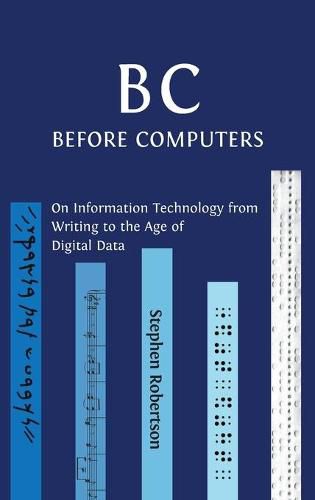Readings Newsletter
Become a Readings Member to make your shopping experience even easier.
Sign in or sign up for free!
You’re not far away from qualifying for FREE standard shipping within Australia
You’ve qualified for FREE standard shipping within Australia
The cart is loading…






This title is printed to order. This book may have been self-published. If so, we cannot guarantee the quality of the content. In the main most books will have gone through the editing process however some may not. We therefore suggest that you be aware of this before ordering this book. If in doubt check either the author or publisher’s details as we are unable to accept any returns unless they are faulty. Please contact us if you have any questions.
The idea that the digital age has revolutionized our day-to-day experience of the world is nothing new, and has been amply recognized by cultural historians. In contrast, Stephen Robertson’s BC: Before Computers is a work which questions the idea that the mid-twentieth century saw a single moment of rupture. It is about all the things that we had to learn, invent, and understand - all the ways we had to evolve our thinking - before we could enter the information technology revolution of the second half of the twentieth century. Its focus ranges from the beginnings of data processing, right back to such originary forms of human technology as the development of writing systems, gathering a whole history of revolutionary moments in the development of information technologies into a single, although not linear narrative.
Treading the line between philosophy and technical history, Robertson draws on his extensive technical knowledge to produce a text which is both thought-provoking and accessible to a wide range of readers. The book is wide in scope, exploring the development of technologies in such diverse areas as cryptography, visual art and music, and the postal system. Through all this, it does not simply aim to tell the story of computer developments but to show that those developments rely on a long history of humans creating technologies for increasingly sophisticated methods of manipulating information. Through a clear structure and engaging style, it brings together a wealth of informative and conceptual explorations into the history of human technologies, and avoids assumptions about any prior knowledge on the part of the reader. As such, it has the potential to be of interest to the expert and the general reader alike.
$9.00 standard shipping within Australia
FREE standard shipping within Australia for orders over $100.00
Express & International shipping calculated at checkout
Stock availability can be subject to change without notice. We recommend calling the shop or contacting our online team to check availability of low stock items. Please see our Shopping Online page for more details.
This title is printed to order. This book may have been self-published. If so, we cannot guarantee the quality of the content. In the main most books will have gone through the editing process however some may not. We therefore suggest that you be aware of this before ordering this book. If in doubt check either the author or publisher’s details as we are unable to accept any returns unless they are faulty. Please contact us if you have any questions.
The idea that the digital age has revolutionized our day-to-day experience of the world is nothing new, and has been amply recognized by cultural historians. In contrast, Stephen Robertson’s BC: Before Computers is a work which questions the idea that the mid-twentieth century saw a single moment of rupture. It is about all the things that we had to learn, invent, and understand - all the ways we had to evolve our thinking - before we could enter the information technology revolution of the second half of the twentieth century. Its focus ranges from the beginnings of data processing, right back to such originary forms of human technology as the development of writing systems, gathering a whole history of revolutionary moments in the development of information technologies into a single, although not linear narrative.
Treading the line between philosophy and technical history, Robertson draws on his extensive technical knowledge to produce a text which is both thought-provoking and accessible to a wide range of readers. The book is wide in scope, exploring the development of technologies in such diverse areas as cryptography, visual art and music, and the postal system. Through all this, it does not simply aim to tell the story of computer developments but to show that those developments rely on a long history of humans creating technologies for increasingly sophisticated methods of manipulating information. Through a clear structure and engaging style, it brings together a wealth of informative and conceptual explorations into the history of human technologies, and avoids assumptions about any prior knowledge on the part of the reader. As such, it has the potential to be of interest to the expert and the general reader alike.